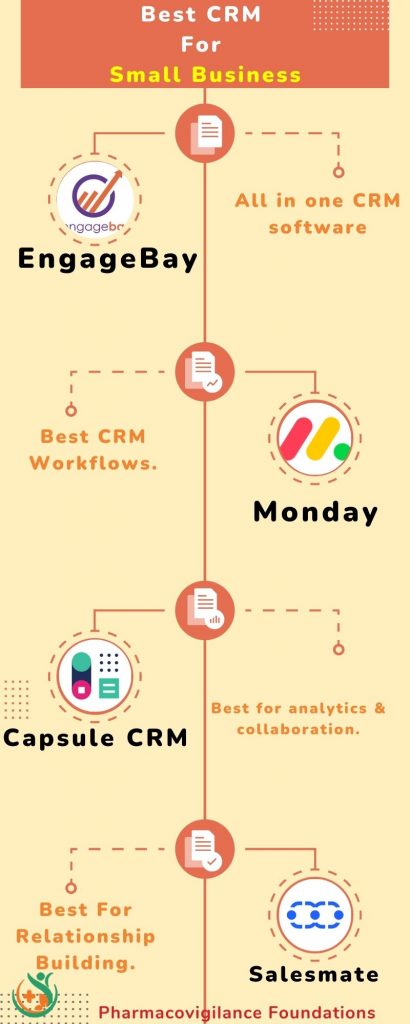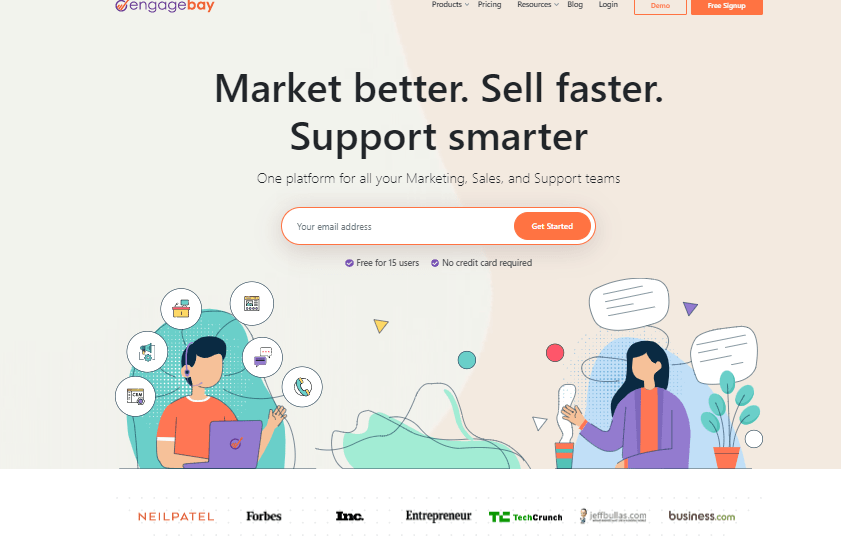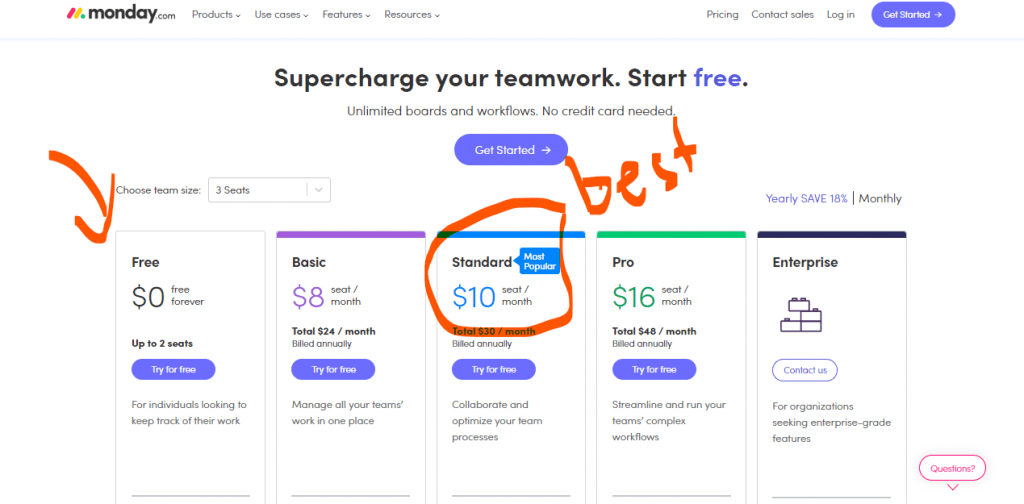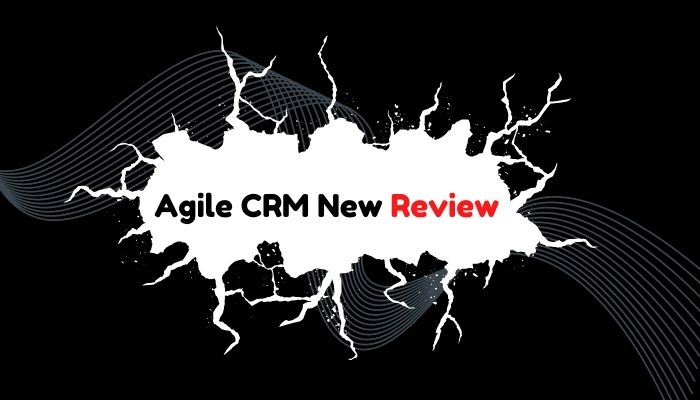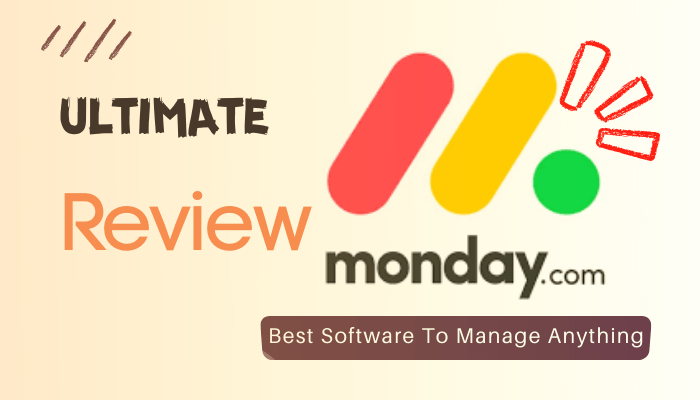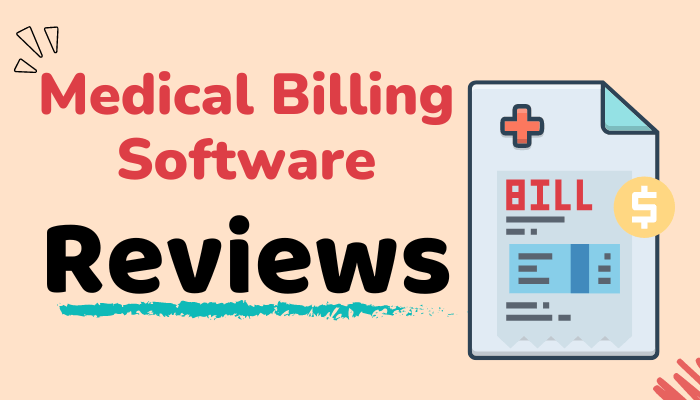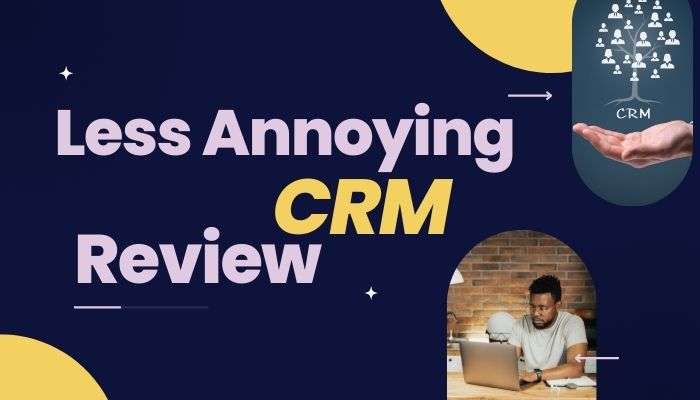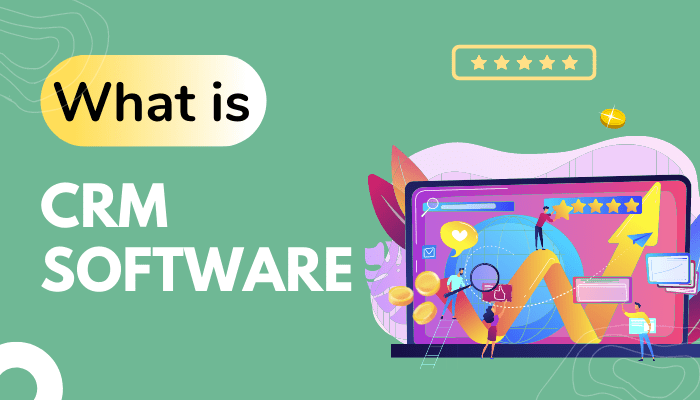27 Best CRM For Small Business 2025-Top CRM Software(Ranked & Reviewed)
CRM for small business owners whether for healthcare that has clinics with many patients or a pharmacist who has a pharmacy with many clients, therefore having CRM software is crucial. Imagine you have a huge list of customers and everyone with different demands and you still have no huge team member to handle all of their requests.
Or how about you are launching new services to your loyal customers, do you want to contact each one of them.
What if I told you all of your business needs can be fulfilled with CRM software. As a small business owner, you can handle unlimited users with those CRM solutions.
What is the best CRM For Small Business?
Here are the top picks based on Captara reviewers.
Top 7 Best CRM software for startups
When you buy through our site, your purchases support the work of this blog. We are reader-supported!
The goal of any small company is always to seek the most effective way to manage their consumer interactions.
As customer relationship management (CRM) software is an essential component of managing those connections, but not all CRM software is created equal.
You may require a different sort of CRM software than another small company depending on your business model.
In this article, you will save time and money as I did the search for you to give the final results about the top CRM software any business owner should use according to the nature of his business to make data-driven decisions. You will know
- What is CRM For Small Business?
- Why is it important to use the best CRM for Small Business?
- What is the best CRM For Small Business?
- What are the types of CRMs?
- Different Types of CRMs according to your needs
- How to choose the best CRM for small business
Working in multinational companies not only made me realize the importance of CRM for team members but also for how they have organized structure to fulfill their customer needs especially when you must follow FDA guidelines and expect FDA inspection.
In order to follow rules, you must have SOPs that can be done and enforced by CRMs.
That is why I learned Phrmacovigilnace fast.
When picking the best CRM for small business or large business to optimize your work to reach its desirable potential there is many CRM software you can choose from.
Not only do the features and performance vary among these companies, but it’s important to consider what discount you’ll get when purchasing their product.
These CRM software reviews will give you two simple decision-making advice
- How to pick the best CRM for your business
- How to save the most money at checkout with the most significant discounts.
Working with big companies using CRM not only to manage their customers but also to manage their team members by servicing the customer with organized SOPs.
What is the best CRM For Small Business?
The best CRM for small business solution provides CRM systems that are designed to help businesses manage their customer relationships.
By tracking customer interactions and data, CRM systems can help businesses to better understand their customers’ needs and preferences.
This, in turn, can help businesses to improve their sales and marketing strategies. For small businesses, CRM systems can provide a number of valuable features and benefits.
First, they can help businesses to track their customer relationships more effectively.
Second, they can help businesses to better understand their customers’ needs and preferences.
Third, they can help businesses to improve their sales and marketing strategies. Ultimately, CRM systems can help small businesses to improve their overall performance.
My Topic picks of best CRM for small businesses
Here is the complete list of best CRM for small business(click for review):
- ClickUp
Monday.com - Capsule CRM
- Salesmatemonday
Daylite Hubspot Keap - ClickUp
Freshsales Bigin – Zoho- Pipedrive
- Less annoying CRM
- Salesforce
- Drip
- Zenddesk Sell
- Kintone
- no CRM.io
- Really Simple System
- Vtiger
- Freshworks
- Insightly
- Creatio
- Bitrix 24
- Agile
- Streak
- InfoFlo
1- Engagebay
One platform for all your Marketing, Sales, and Support teams.
EngageBay is a cloud-hosted CRM system that is a one-stop shop for all your business needs.
EngageBay is CRM For Small Business software that integrates sales, marketing, and finances into an efficient platform with automation features that help you get things done quickly without having to worry about any tedious tasks!
EngageBay offers a marketing and sales automation platform with CRM capabilities.
This means you can keep track of your contacts’ emails, phone calls, or any other interactions in one place without having to do extra work!
The system also has features like simple contact management which integrate seamlessly into MailChimp so it’s easy for everyone involved – whether they’re on the receiving end themselves or sending out messages containing opportunities worth pursuing.
You’ll never miss an important message again thanks to Enganges’ powerful analytics tools that show exactly where potential clients come from.
Key Features:
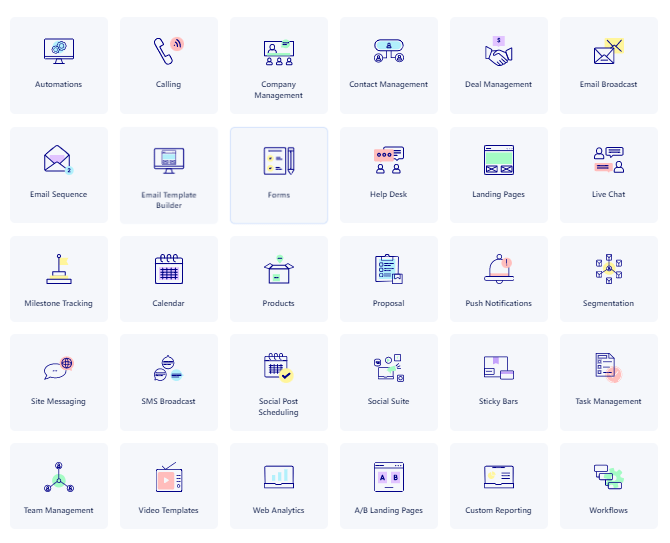
- Email Marketing: This email marketing software offers a great module, with features like A/B testing and more.
- Lead Generation: Lead generation has never been easier with features like contact import and export, and lead capture database integration. You can even score your prospects or segments based on certain criteria!
- Marketing Automation: Offers a suite of customizable CTA, drip marketing campaigns, and sales intelligence.
- Social Media Marketing: EngageBay is a comprehensive suite of tools for social media marketing. It not only performs analytics, contact management, and automated publishing but also content creation across multiple accounts all in one place!
Price:
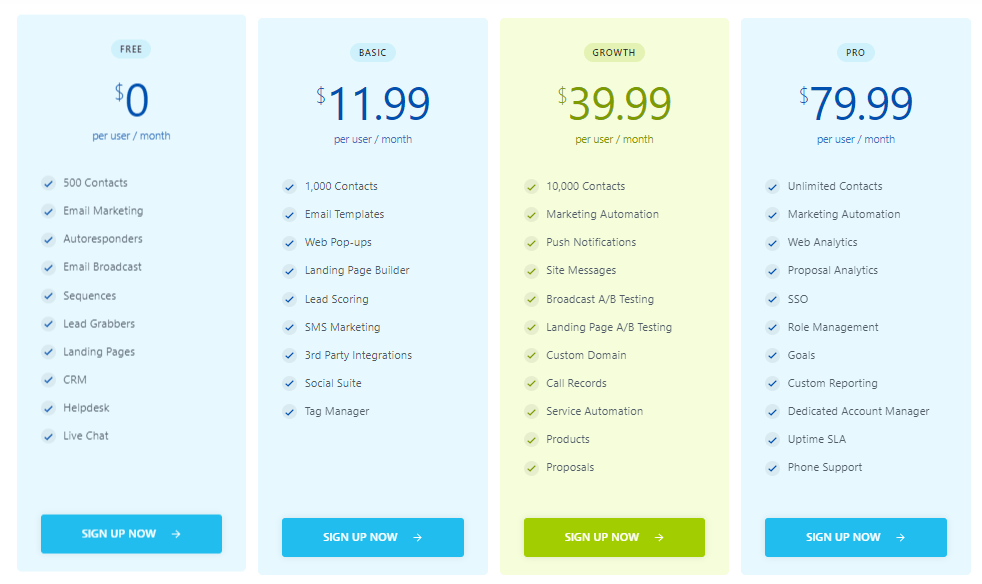
It has four broad segments:
- All-in-one
- Marketing
- CRM & sales bay
- Service Bay
Pros:
- Provides a fantastic free plan. Integrations with third-party apps like Zapier, Xero, and others.
- Scalable and highly customizable.
- Its user-friendly feature is simple and intuitive.
- Customer service is available through phone, live chat, email, and ticket.
- Paid programs come with a free trial period.
- One of the most cost-effective programs available (entirely cloud-based).
Cons
- On-premise deployment is not available.
- Only English software is supported.
2- Monday.com
Best CRM Workflows.

Customize your own workflows.
Price: 0$ : 16$
Monday.com is the best CRM For Small Business because it has features that cater to your needs as an individual business owner or marketing professional with specific requirements for managing leads and sales pipelines!
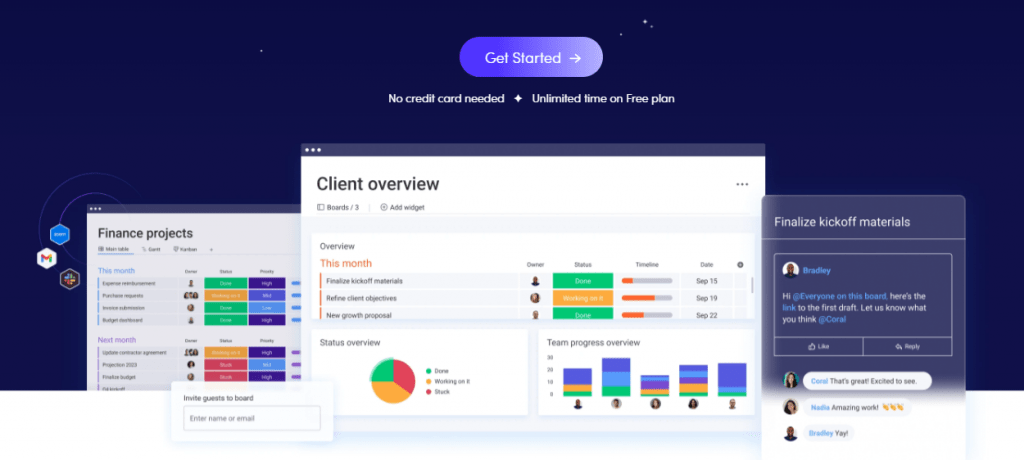
Monday offers custom workflows tailored specifically around what you want, allowing complete control over how information flows through this platform.
So there are no unnecessary distractions from other users’ data-driven approaches toward customer engagement.
While also provides access 24/7 without any artificial deadlines set by software algorithms determining when users get responses back regarding their messages left unanswered on Monday’s CRM platform.
Key Features:
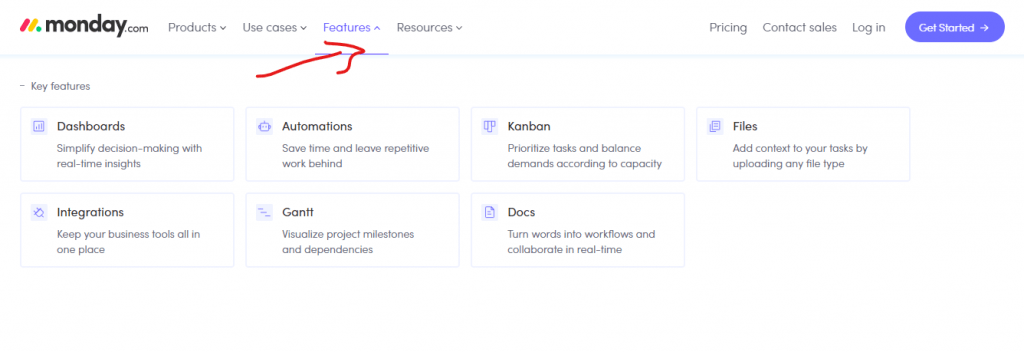
- Have everything in front of you so you can notice any possible issues in your sales cycle fast.
- All components of the sales process can be tracked with ease.
- Great for businesses who want to keep a tight eye on their sales funnel and performance.
- Monday.com has a mobile app that you may use while on the go.
- Monday.com can be integrated with other apps and tools you use.
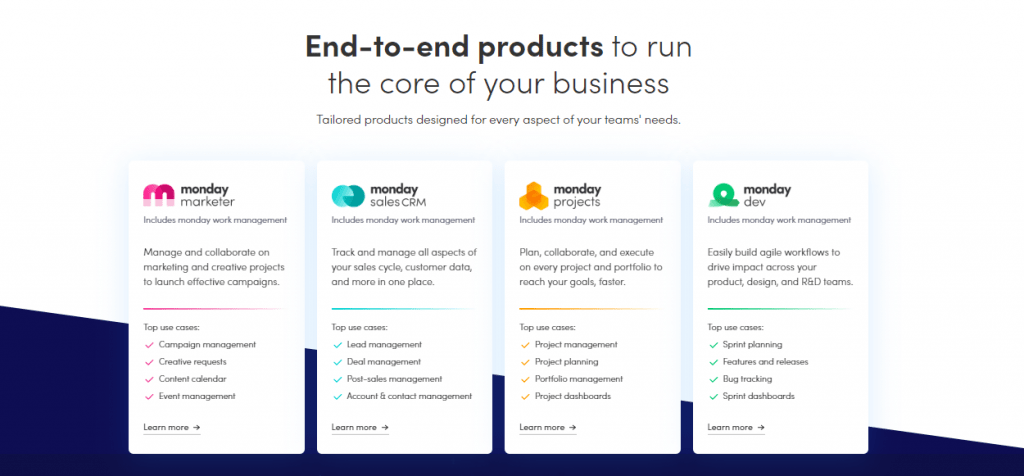
Price:
You may test out all of Monday.com’s services for free for 14 days to determine if it’s a suitable fit for your company.
- Individual: $0 free forever
- Basic: $8 / seat / month
- Standard: $10 seat / month
- Pro: $16 seat / month
- Enterprise: Contact them for a custom plan
Pros:
- You may use this platform to collect user feedback and then show it in a chart so that you can make data-driven decisions.
- Real-time collaboration with team members makes it simple to complete tasks fast.
- Excellent at project management and scheduling.
Cons:
- The search functionality of Monday Work Docs isn’t as good as some of the other options available.
- Creating workflows is more difficult than it should be with so many options.
Product Updates:
The Connect Boards Columns feature allows you to see even more data points at a glance, so your team can stay on top of their game. The presentation mode makes it easy for others in the meeting room with you as well!
3- Capsule CRM
Best for analytics and collaboration.
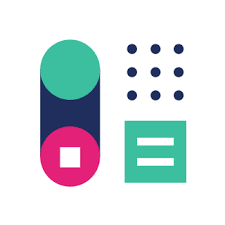
For organized customer information
Price: Free Trials : 54$
Capsule CRM is CRM For Small Business and a new and innovative solution designed to be simple enough for smaller teams, yet powerful. At only $18 per user monthly with the Professional tier available on purchase of 3 or more users.
It’s created specifically catering to business’s needs as they grow their organizations without sacrificing efficiency!
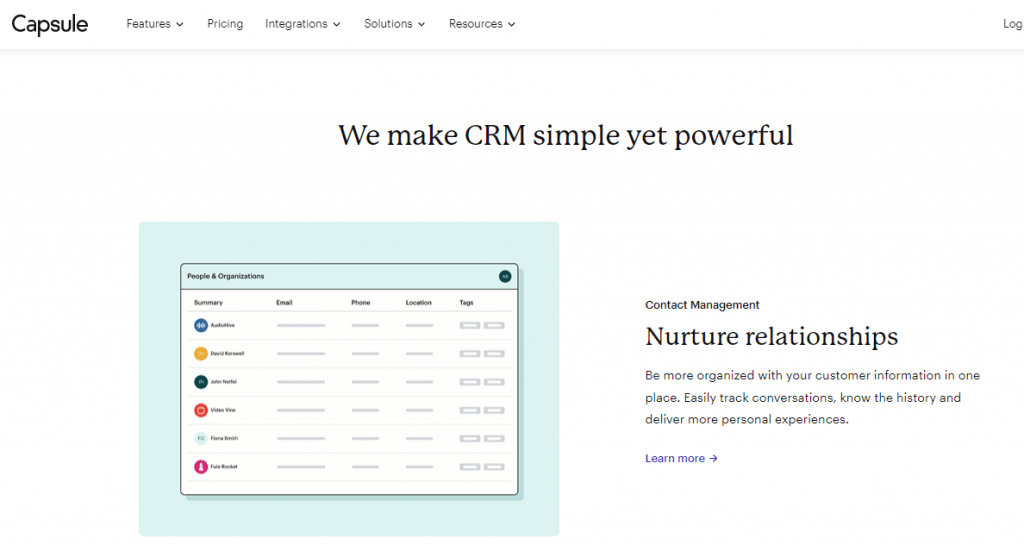
The most popular CRM system among small and medium-sized businesses is Salesforce.
It’s easy to use and offers great flexibility with its mobile apps for tablets or smartphones as well as the ability to automate many tasks through its Skyhook platform which connects all your leads into one database.
So you can send messages more effectively using AI called Chatbot standard features like call tracking have made this type of customer relationship management much simpler than ever before!
Capsule CRM features a contact management toolkit and task lists that can be assigned by employees to themselves if needed alongside their regular workloads of course.
It also includes sales pipeline trackers so you know where your business stands at any given time–and there are plenty of reports available for data-driven decision-making! similar in some ways to Insightly – but note its mobile apps too (for Android & iOS users).
Price:
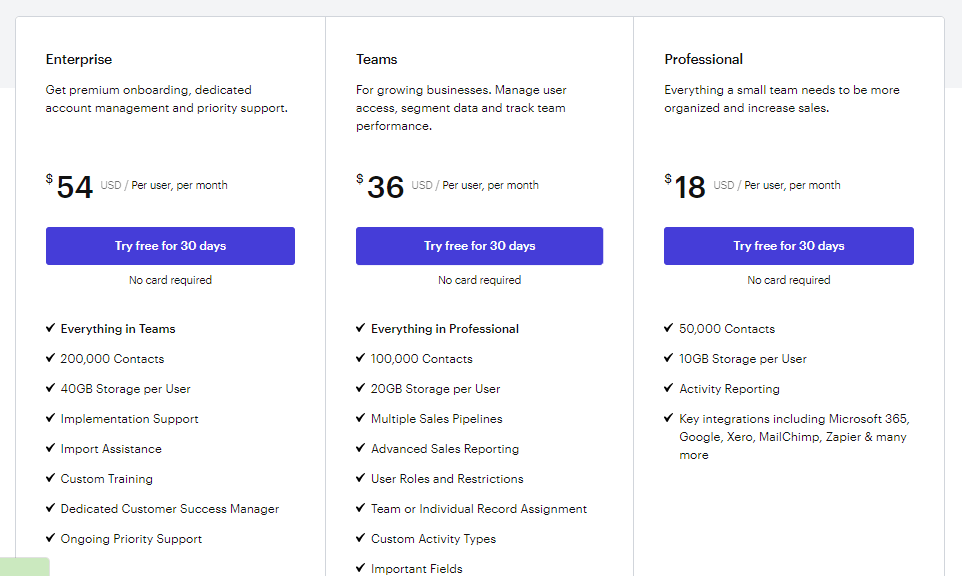
Prons
- Outstanding note-taking and sharing functions.
- Remind businesses to reach out to contacts they haven’t spoken to in a while.
- There are numerous connectors with the most commonly used SMB tools.
Cons
- More analytics options would be beneficial.
- Some of the functionality requires some digging.
- For larger businesses, the feature set may be limited.
4- Salesmate
Best For Relationship Building.
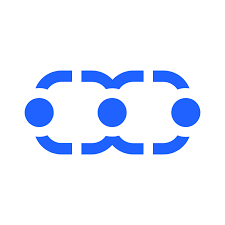
To increase revenue and connections
Price: 12$ : Custom Plans
Salesmate is CRM For Small Business and my go-to for the best customer service and relationships. Whether you need help finding your way, or just want to stay on top of things with an easy interface that’s always available – they’ve got what it takes!
Key Features:
Sales sequences provide a central hub to help you with your sales efforts. With features like email campaigns, drip workflows, and lead assignment systems.
It is easy for your team members of yours in any stage of the cycle to stay on track while having access to all activities from one place at once!
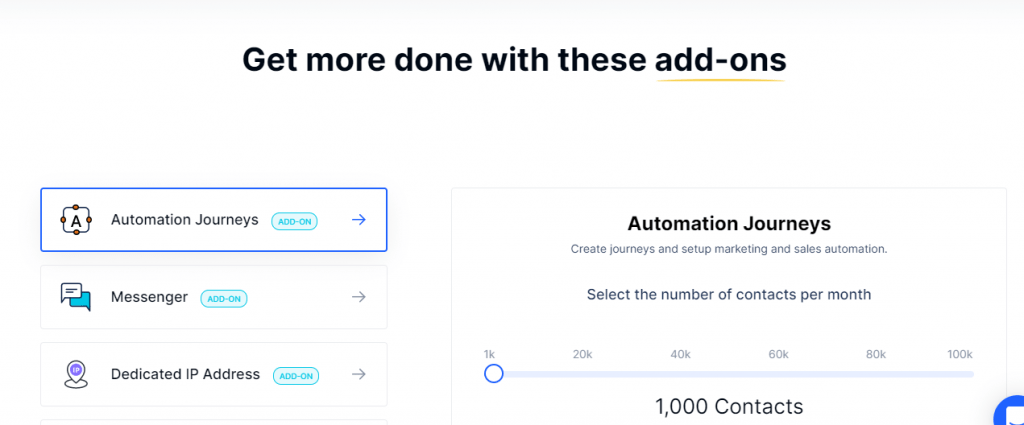
Price:
Best plan to start with Growth: $24 per user/ month.

Pros:
Salesmate is a powerful tool for sales teams that helps you connect with your contacts in seconds.
It has 700+ commercial app integration and supports Google Apps, Microsoft or Zapier to help streamline communication across multiple channels – including over phone calls!
With their easy-to-use interface, they provide secure & compliant enterprise security standards.
So it’s safe on both private data as well as sensitive information like billing details etcetera when used by businesses looking at all possible means of contacting potential clients without compromising anything along the way.
Cons
Sometimes you need to refresh the page a few times before it loads correctly.
Email tracking isn’t as accurate and can get lost in all of your other tasks, which makes managing events difficult for some people with busy schedules like mine!
A better scheduler will make sure that nothing falls through the cracks – even if I’m switching between different browsers or devices while writing this blog post (which happens sometimes).
5-DayLite
Best for Mac, iPhone, and iPad users.

Best for startups and small businesses.
Price: 39.99$
The Daylite is CRM For Small Business and has a set of tools is divided into CRM features and project management.
The idea here was to break down the old division between customer-facing tasks, which aren’t just for sales or marketing departments.
All companies can use it as they stay informed on what’s happening with one client at any time by viewing their projects’ status reports within this app!
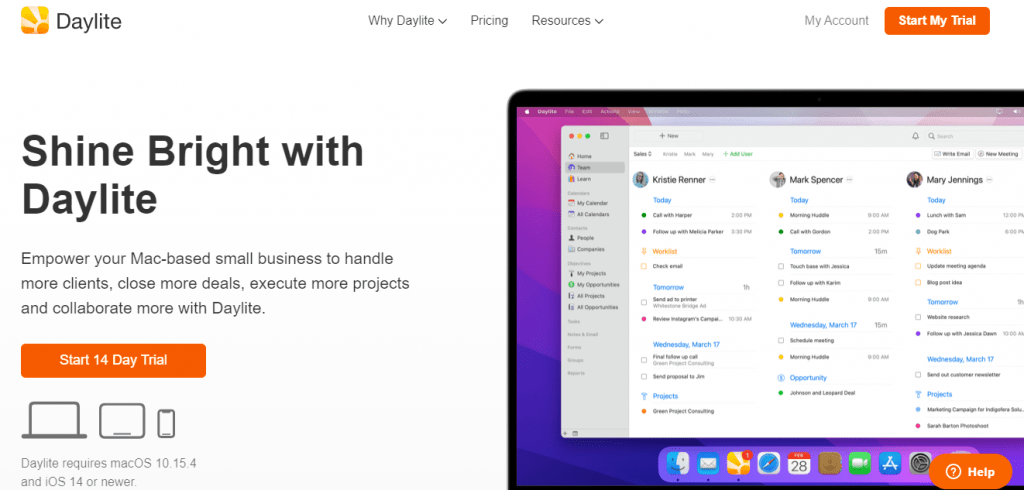
Key Features
Daylite is a CRM built for the everyday person. It doesn’t have any of those fancy charts or reports that you need a degree in statistics to understand,
But it does offer features like shared tasks and calendars so everyone on your team can work more efficiently together!
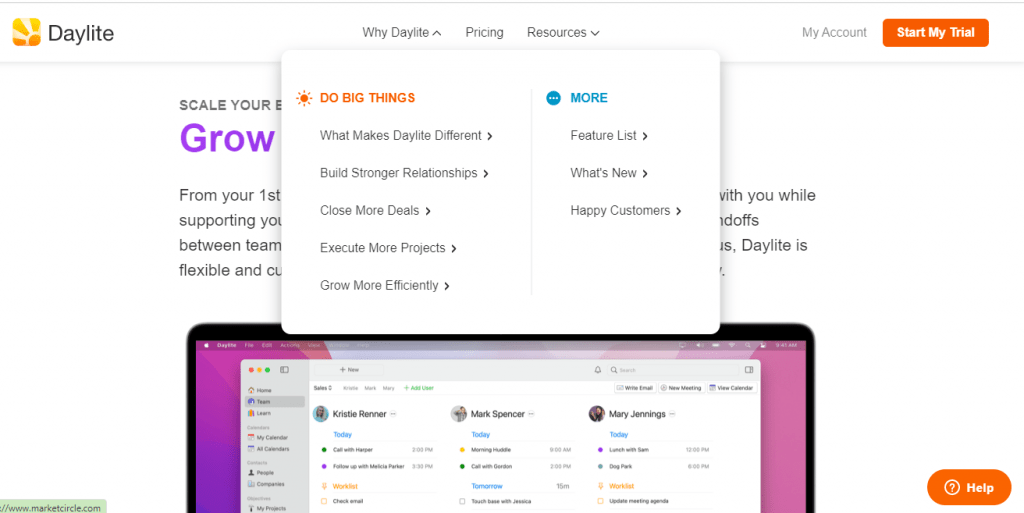
Daylite has a Mac-friendly design and is easy to use, so that you can have all of your information at the tip of your fingers.
Better still: it works on any computer or iOS device with an internet connection – no matter what kind!
You’ll be able to access email history as well as call notes & reminders which will help minimize downtime while maximizing efficiency for both yourself AND potential customers alike.
Prices
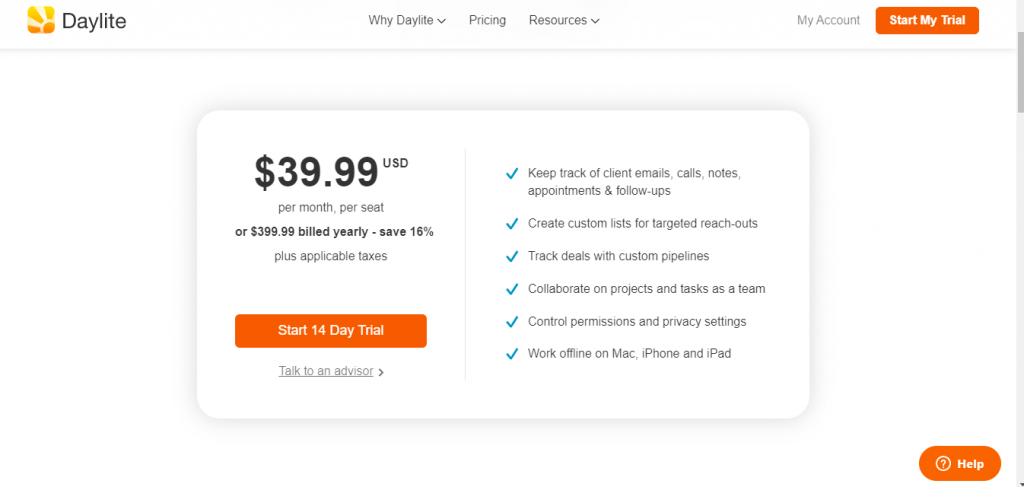
Daylite is a month-to-month service that includes 14 days of free trials and 30 minute onboarding calls.
Pricing varies depending on region, but the average cost per user ranges from $39-$44 dollars with special offers available for new clients and introductory pricing as low as 19$/user each month!
Pros
Easy to use.
Cons
Daylite’s one plan means that there’s less flexibility in pricing and packages. Another Limitation here is the app only works with Apple devices, which limits its potential audience even more so than before!
Best CRM For Small Business The Remaining List
[wptb id=2297]What is CRM For Small Business?
Customer relationship management (CRM) is a term that refers to the various ways in which a company cultivates and maintains relationships with its customers.
CRM solutions are typically used to track customer interactions, manage customer data, and automate various customer-facing processes.
For small businesses, CRM can be an invaluable tool for streamlining customer interactions, improving customer satisfaction, and driving sales growth.
By investing in a CRM solution, small businesses can level the playing field against their larger competitors.
With the right CRM solution in place, small businesses can successfully compete with even the largest enterprises.
Why is it important to use CRMs for small business?
Customer relationship management software is a tool that helps businesses manage their customer relationships.
It can track customer contact information, sales and marketing activities, customer service issues, and business plan processes.
The right CRM can help businesses improve relationships, streamline their business processes, and increase sales. Small businesses can benefit from CRM software by using it to manage their relationships more effectively.
The best CRM software for small businesses will offer features designed specifically for small businesses, such as deal management and customer contact management.
By using the best CRM for small businesses, businesses can improve relationships and increase sales.
Benefits of Using A CRM for small businesses
1- Customer service improvements
Customer service is a vital part of any business, and it’s important to always be looking for ways to improve.
By making small changes to the way you nurture customer relationships, you can make a big impact on your bottom line.
Investing in a user-friendly customer interface can make it easier for customers to do business with you, and streamlined data entry can help reduce support costs.
By taking the time to improve your customer service using CRM For Small Business, you’re showing your customers that you value their business – and that can make all the difference.
2- CRM aids the expansion of your company.
When you’re running a business, it’s important to have systems in place that will help you streamline your operations and manage your growth.
Enterprise resource planning (ERP) and customer relationship management (CRM) are two tools that can be very helpful in this regard.
ERP software helps you to manage your back-office processes like accounting, HR, and inventory, while CRM software helps you to manage your sales processes and relationships with your customers.
Basic CRM For Small Business functionality can be very beneficial for small businesses that are looking to expand their operations. CRM aids the expansion of your company by helping you to better manage your relationships.
With CRM For Small Business, you can track your sales pipeline, identify opportunities for new business, and keep track of your customer’s contact information and purchase history.
This information can be very valuable as you look to grow your company and take on new customers.
3- Increase consumer loyalty.
There are plenty of reasons to increase consumer loyalty, and sales teams are always looking for new ways to improve sales numbers.
Communicating with customers by sending emails to their email address is one of the best ways to stay in touch and build a relationship with them.
By using email templates, you can email customers regularly without having to worry about the content of each email. This helps you to stay on top of customer communication and keep your brand fresh in their minds.
Additionally, email integration with CRM software makes it easy to track customer interactions and gather data that can be used to improve your marketing strategy. As a result, sending emails to customers is an important part of any effective marketing plan.
A big reason why deal management and CRM For Small Business solutions are so important is that they can help increase customer loyalty.
By tracking sales reps’ interactions with customers, sales teams can identify which deals are most likely to result in lifelong customers.
Additionally, sales teams can provide sales reps with the resources they need to nurture relationships with existing customers and prevent them from defecting to a competitor.
By increasing customer loyalty, sales teams can improve their sales numbers and build long-term relationships with their best customers.
4- Assist in the coordination of teamwork.
Assist in the coordination of teamwork is a small business CRM For Small Business solution that helps you manage your customer relationships.
It’s a CRM platform that small businesses use to track and manage their customer data. The best CRM software for small businesses is one that is affordable, easy to use, and provides the features and functionality you need.
Assist in the coordination of teamwork meets all of these criteria and more.
With its simple interface and robust feature set, it’s the perfect tool for small businesses looking to improve their customer relationship management.
Thanks to its affordable price and easy-to-use interface, Assist in the coordination of teamwork is the best CRM for small businesses.
5- Internal communication is improved.
There are many benefits of internal communication, but one of the most important is that it can help to improve sales pipeline management.
By making sure that everyone in the organization is on the same page and aware of the sales pipeline, it becomes easier to track progress and ensure that sales goals are being met.
Additionally, internal communication can help to identify any potential bottlenecks in the sales process so that they can be addressed quickly.
Finally, internal communication can also help to build team morale and motivation, both of which are essential for a successful sales team.
With so many benefits, it’s no wonder that more and more organizations are turning to sales pipeline management tools like Free Plan to improve their internal communication.
6- Improve your marketing strategy.
The user interface is important because it helps you understand what the user wants. The user interface is the way the user interacts with the software.
It is important to have a user interface that is easy to use and understand. The user interface should be able to show you the data that you need to see.
Reporting tools are important because they help you collect data about your marketing strategy. Tools help you track your progress and see where you need to improve your marketing strategy.
Software companies offer a variety of different tools. Some software companies offer free tools, while other companies charge for their tools.
However, there are many benefits to using paid tools.
Paid reporting tools usually offer more features and options than free tools. They also often provide support and training on how to use their tools.
Lastly, using paid reporting tools can help you build trust with your audience. If you use free reporting tools, your audience may think that you’re not serious about your marketing strategy.
However, if you use paid tools, your audience will know that you’re serious about your marketing strategy and that you’re willing to invest in it.
7- Organization of Customer information
Organizing customer information is essential for any sales team. It allows you to keep track of your interactions with each customer, as well as their contact information and purchase history.
This data can be extremely valuable when it comes to upselling and cross-selling products and services.
Additionally, having this data organized can help you resolve customer issues more quickly and efficiently.
CRM for small business services can be extremely helpful in this regard, as they provide software that is specifically designed for small businesses.
This software can be customized to fit your specific needs, making it easy to keep track of your customers and their data.
Ultimately, organizing customer information can help increase sales and improve customer satisfaction.
8- Everyday jobs can be automated.
Using project management features alongside third-party integrations can be very helpful for small businesses.
They can automate many of the tasks that need to be done on a daily basis, such as project tracking, invoicing, and project scheduling.
This can free up a lot of time for the business owner, allowing them to focus on other aspects of their business. In addition, project management features can help to keep businesses organized and efficient.
By having all of the tasks and deadlines in one place, business owners can easily see what needs to be done and when it needs to be done.
This can help to avoid missed deadlines and projects that fall behind schedule. As a result, project management features can be extremely beneficial for businesses of all sizes.
9- Data and reporting analytics are improved.
There are many benefits to using data and reporting analytics in your business. Perhaps the most important benefit is that it can help you generate more leads.
By understanding which marketing channels are most effective, you can allocate your resources more efficiently and generate more leads.
Additionally, data and reporting analytics can help you better understand your customers. You can segment your customer base more effectively and target your marketing efforts accordingly.
Finally, data and reporting analytics can help you improve your customer relationship management (CRM). By understanding which interactions are most likely to lead to a sale, you can optimize your CRM strategy and close more deals.
In short, data and reporting analytics offer a wealth of benefits that can help any business improve its bottom line.
It will be so easy with third-party integrations and the best project management tools cause you will have them all in one of the project management suites.
11- Workflow automation
Workflow automation is one of the most important business tools you can invest in because it future-proofs your sales to make your human resources team focus on hiring more professional team members to take you to the next level.
If you automate tasks, you free up your human resources time to focus on developing relationships with clients and prospects and growing your business.
In addition, workflow automation provides an accurate record of your sales process, which can be used to improve future sales outcomes.
Finally, workflow automation can help to identify bottlenecks in your sales process and provide insights into how you can improve your conversion rates.
Investing in workflow automation is an essential part of future-proofing your sales.
What are the types of CRMs?
1- Operational CRM
Imagine a world where your customer data is always up-to-date and ready for use.
A CRM that can automatically generate reports, send out personalized emails based on what they need most right now (or even just one hour ago!), and schedule appointments with zero time wasted.
All while keeping track of who’s coming in through each stage of their journey so you know how best to reach the next!
There are plenty more benefits too, but this article will stop here because we don’t want anyone reading it to get overwhelmed by possibilities…
2- Analytical CRM
The CRM system is a powerful analytical tool even it is not your best hard skill that can give you deep insights into your customers’ buying behavior and trends, so it’s perfect for marketing decisions.
3- Collaborative CRM
Collaborative CRM is a platform that facilitates communication and sharing of vital customer information with both internal (agents/employees) and external stakeholders.
This is done by involving all those concerned in coming up with more effective promotions & campaigns!
Is CRM software only for Small Business or Large Business?
Businesses don’t need CRM anymore! It’s too expensive and unnecessary, right? Wrong.
Every small business whose owner agrees with the statement above is doomed to failure because they’re missing out on crucial relationships with customers that can help them grow their company in today’s competitive marketplace.
But times have changed relationships between businesses are just as important now if not more so than ever before; your success depends upon managing those connections well for long-term growth potential with your team and customers.
Which CRM is best for small businesses?
With the rise of social media and customer-centricity, it is no wonder that CRM For Small Business software tops financial planning companies’ list of most valuable types in 2021.
Markets are becoming more oriented towards consumers’ needs today than ever before due to democratization by accessible technology like smartphones.
This allows people worldwide to stay updated on brands at any given moment; recent stats show there was a 40% decrease among US customers who stopped doing business with companies.
Because they received poor service, nearly one out of each two-three interactions are occurring via digital channels nowadays!
As a large business company, its CRM should have specific benefits to manage its large data. As customers expect more from the large company’s customer services.
Therefore, CRM in use must fulfill all complex tasks and deliver an excellent experience.
What Makes a Good CRM Software for a small business?
A customer relationship management (CRM) software solution is a tool that small businesses can use to streamline and improve customer interactions.
A good CRM software solution will help businesses keep track of customer contact information, sales and support inquiries, and marketing campaigns.
Additionally, a good CRM solution will provide businesses with valuable insights into customer behavior, allowing businesses to make better decisions about how to engage with their customers.
There are many different CRM software solutions on the market, so it is important for small businesses to do their research and choose the best CRM software for their specific needs.
Ultimately, a good CRM software solution can help small businesses improve their customer relationships and drive more sales.
Which CRM is easiest to use?
As anyone in sales knows, customer relationship management (CRM) software is essential for keeping track of leads and nurturing them through the sales pipeline.
But with so many CRMs on the market, it can be tough to know which one is right for your team. If you’re looking for a CRM that’s easy to use, Hubspot CRM is a great option.
HubSpot CRM is intuitive and user-friendly, and it comes with a variety of features that can help you manage your sales pipeline, including sales forecasting and pipeline management tools.
Plus, HubSpot CRM integrates with a variety of other software applications, making it easy to get started using it. So if you’re looking for a CRM that’s easy to use, Hubspot CRM is a great option.
What is the best CRM for small businesses you can buy today?
Here are my top picks for you:
1- Engagebay
2-
3- Capsule CRM
4- Salesmate
5- Daylite
6- Hubspot
7- Keap
How to choose the CRM for small business
1- Know what CRM is all about.
CRM is a business topic that has been written about for years.
There’s no shortage of information on what it does, its benefits and advantages to your company as well as how you can implement CRMs into an already established system in order to reach optimum performance levels from start-to-finish!
2- Know your business requirements and
The best CRM tool is not always the right one – but you must have both. The first question to ask yourself when deciding on your software choice?
Do I really need it or can my customer experience management (CEM) application do what’s required of me instead!
But there’s a difference between these two types: if budget allows then go ahead with both; otherwise prioritize getting better at understanding customers.
through richer data sets in an effortless way by using more advanced features found only within some companies’ offerings such as Marketo’s Marketing Cloud Service.
If money isn’t an issue, however, consider focusing solely on operations on growing sales because this will
3- Examine Examine the various types of CRM and the software’s features.
You can’t just find one size that fits all. Even if you have all of the good soft skills to manage your customers…
The closest thing to “one-size” in this case would be an operational CRM system that provides a platform and common data for sales, and marketing.
As well as support teams to work on when they need information about customers from your database or “single source of truth.”
4- What characteristics should you search for in a CRM?
There are many features you should consider when choosing CRM software. Some vendors may have similar offerings but make sure that the product is equipped with tools and capabilities for these important tasks:
- Lead management
- Contact management
- Automation
- Campaign management
- Email tracking
- Social media management
- Dashboards & reports
- Mobile apps
You’ve been put on the spot! In all honesty, there are so many cloud-based CRM tools out in today’s market that it can be hard to choose which one is best for your business.
That said we’ve done some of this work already by coming up with a list among our favorite solutions available – these products have received high marks when reviewed based on certain criteria such as functionality and pricing structure (among others).
Consider giving them a go if you haven’t tried something new yet or want something better than what competitors offer.”
5- Does the price fit with your budget for long term
The cost of CRM software depends on many factors such as the subscription plan and deployment methods.
Cloud-based SaaS services have become quite affordable, which means that even small businesses can afford them without breaking their bank account in this difficult economic time!
6- Find out more if the CRM company develops its software or not (room for growth.)
The vendor or software company is just as important to your business’s success. Why? You’ll be relying on them for customer support and assistance with the product long after you’ve used it!
Thus, they must provide reliable services that are available at all times from every channel imaginable – tickets via email/phone, etc.; live chat whenever possible too
7- Sign up for a trial to test if it fits your needs or not
Try out the software for yourself before making a decision.
Most vendors offer free trials that allow you to use all features and see if it’s intuitive or not; don’t worry about the cost because these things are usually smoke-and-mirror deals anyway!
FAQs
Can I use Google Calendar instead of CRM Software?
If you’re like most business owners, you’re always looking for ways to save time and money. One area where this is especially true is customer relationship management (CRM).
CRM software can be expensive, and it can take some time to learn how to use it effectively. For these reasons, you may be wondering if you can simply use Google Calendar instead.
The short answer is yes, you can use Calendar instead of CRM software. However, there are a few things to keep in mind.
First, while G.Calendar is free, it doesn’t have all the features of a dedicated CRM software program.
Second, you’ll need to add your customers’ contact information manually; you can’t simply import it from a database or business card.
Finally, you’ll need to remember to share your G.Calendar with your team so that everyone has access to the same information.
While using it instead of CRM software isn’t ideal, it can be a viable option if you’re on a tight budget or if you’re not ready to commit to a full-fledged CRM solution.
Can CRM be used as a social media marketing tool?
In recent years, social media has become an essential part of many businesses marketing plans.
As a result, more and more companies are looking for ways to integrate social media into their customer relationship management (CRM) systems.
While some CRM providers offer social media features as part of their package, others allow customers to integrate third-party social media applications. In either case, CRM can be an invaluable tool for social media marketing.
By tracking customer interactions and social media activity, businesses can gain valuable insights into what customers want and how they can better serve them. In addition, CRM can help businesses track and respond to customer complaints and issues.
By using CRM to manage social media interactions, businesses can improve customer satisfaction and build long-term relationships.
Can CRM be used as a marketing tool?
CRM, or customer relationship management, is a system for managing customer data. It can be used to track key business metrics such as customer acquisition and retention, customer lifetime value, and customer satisfaction.
CRM can also be used as a marketing tool. Marketing automation is the process of using software to automate marketing tasks.
It can include tasks such as email marketing, social media marketing, and targeted advertising.
Marketing automation can help businesses save time and money by automating repetitive tasks.
In addition, it can help businesses track their marketing campaigns and measure their return on investment. For these reasons, CRM can be an effective marketing tool.
What is the difference between CRM and Microsoft office 365?
CRM, or customer relationship management, is a software program that helps businesses manage their customer relationships. It can track customer contact information, sales and marketing activities, and support requests.
Microsoft Office is a suite of productivity software that includes programs like Word, Excel, and PowerPoint. It also includes business-oriented features like business cards and a shared calendar.
Both CRM and Office 365 can be used to manage business contacts as business cards, but they offer different features and benefits. CRM is focused on customer relationship management, while Office 365 offers a broader range of productivity tools.
Office 365 also includes artificial intelligence-powered features like business card scanning and automatic contact categorization.
Choose the software that best meets your business needs. If you need help managing customer relationships, go with CRM. If you need a suite of productivity tools for your business, Office 365 is the better choice.
Is CRM useful for small businesses?
CRM, or customer relationship management, is a type of software that helps businesses manage their interactions with customers.
It can be used to track customer contact information, sales leads, and business operations.
While CRM software is often associated with large enterprises, it can also be beneficial for small businesses.
Small business CRM software can help small businesses manage their customer relationships more effectively.
It can also help small businesses to automate their lead management and business operations.
As a result, small business CRM software can be a valuable tool for small businesses that are looking to improve their relationships with customers and grow their business.
Can CRM software be used for real estate business?
Yes, you can.
Which CRM is easiest to use?
There are many CRMs on the market, and it can be difficult to decide which one is right for your business.
However, ease of use should be one of your main criteria when choosing a CRM. After all, if your team can’t figure out how to use the CRM, it won’t do you any good.
With that in mind, we’ve evaluated several popular CRMs and determined that Zoho CRM is the easiest to use.
The interface is straightforward and intuitive, and the software is packed with features that make managing relationships with customers a breeze.
Best of all, Zoho CRM is affordable, making it a great option for businesses of all sizes. So if you’re looking for a CRM that’s easy to use, Zoho CRM should be at the top of your list.
Warp UP
Small businesses have unique needs, and not every CRM is a good fit for them. In order to find the best CRM for your startup, you’ll need to evaluate your business’s specific requirements.
You’ll also need to consider the size of your company and your budget. With that in mind, we’ve compiled a list of the best CRM that meets your business needs.

